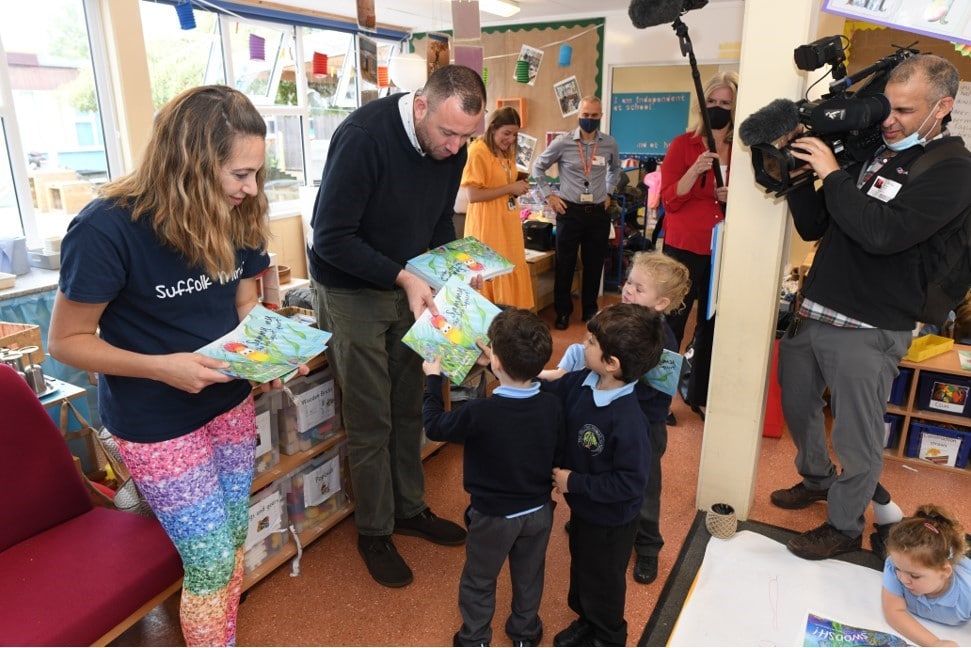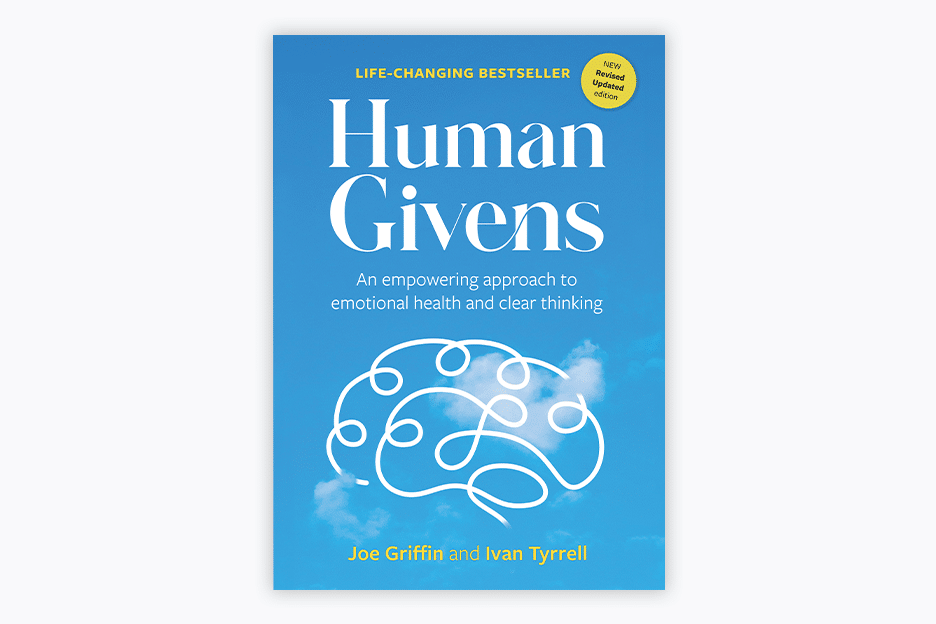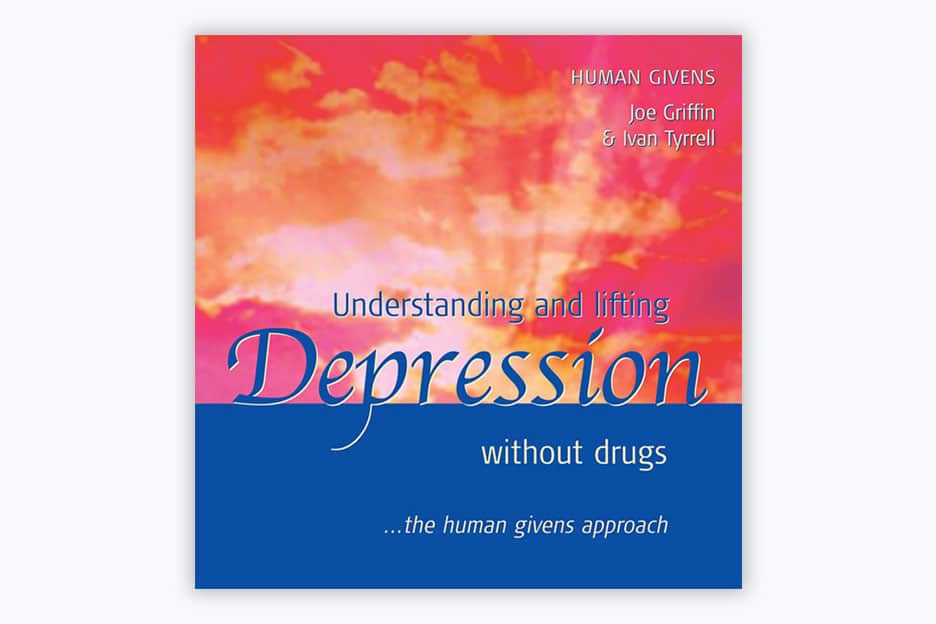How Suffolk Mind uses HG to improve mental health across their county
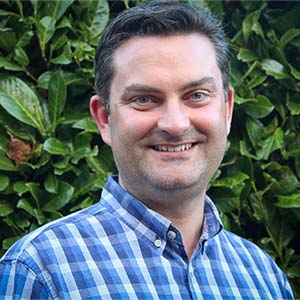
Jon Neal - CEO at Suffolk Mind
“Our goal is to make Suffolk the best place in the world for talking about and taking care of mental health – the human givens approach is central to our strategy to achieve that,” says Jon Neal, CEO at Suffolk Mind. “It’s an essential framework for achieving good mental health, which is why we’ve been using it for over 10 years.”
Suffolk Mind aims to raise awareness throughout the county of how to stay 
The HG approach offered the team the new direction they were looking for…
The HG approach was first introduced to Suffolk Mind back in 2010 by Ezra Hewing – then coordinator of Suffolk Mind’s community resource service and HG Diploma holder – at a time of transition for the team. At first, they applied it in two very different projects – one aimed at helping local businesses to improve the mental health and wellbeing of its employees, and the other at sharing essential mental health and wellbeing information with the local Muslim community. Both were effective and very well received, and the team found the HG approach offered them the new direction – and the organising framework – they were looking for. It is now at the heart of the vital work Suffolk Mind do every day across their county – with schools, businesses, NHS trusts, local authorities and individuals.
Central to the HG approach is the concept that every single one of us is born with essential physical and emotional needs – and that if we are able to use our innate resources to meet these needs, in healthy, balanced ways, we will be able to live mentally healthy and fulfilling lives. And this understanding – that mental health applies to everyone – is at the core of Suffolk Mind’s inclusive and proactive ethos.
“All of us have mental health, just as we have physical health. We are all on the mental health continuum – and we move up and down it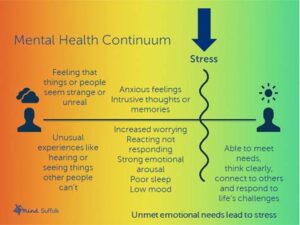
They show how this, in turn, can result in severe and enduring mental illness, including anxiety, depression and even psychosis. “Organised more and more on human givens principles, we are working to filter these valuable understandings into all aspects of life in our county, as everything – ranging from the built environment to public services to home, school and work life – can act either as a barrier or an aid to getting needs met,” says Jon Neal.
Suffolk Mind also ensure that many of their staff have taken the HG Diploma as part of their training, so that they are able to use and share HG insights and therapeutic techniques in their daily work within the community.
The clarity HG provides is welcomed by individuals and organisations…
The simplicity of HG’s Emotional Needs and Resources Model and the clarity it provides are welcomed by both individuals and organisations, Jon Neal explains. “The clear organising idea is so accessible,” he says. “It offers people a concrete way of answering the questions: how do you prevent mental ill health and where are our funds best spent? It opens doors because people can immediately see the value of it.”
Jon finds that Suffolk Mind is very often approached by local organisations, who value its insights and expertise. The team contributed, for example, to the Bury St Edmunds Town Centre Master Plan, helping ensure the design of new spaces, signage and street furniture took account of people’s emotional needs for connection, privacy, control and security – as well as of their physical needs. The East and West Suffolk NHS Clinical Commissioning Group has recently asked them to advise on helping staff to heal and move forward through the pandemic, and they are also involved in the design of a new hospital in West Suffolk, where they are again focused on ensuring that emotional, as well as physical, needs can be met.
Suffolk Mind is very often approached by local organisations, who value its insights and expertise...
The Emotional Needs and Resources model and the mental health continuum also provide structure and focus to the team, giving them an organising framework around which to develop a spectrum of services, designed to meet the varying needs of the Suffolk community.
At one end of the continuum, for people who are currently meeting their needs relatively well, Suffolk Mind runs an extensive programme of education and outreach – aiming to reach every member of the Suffolk community and to raise awareness among them of the importance of continuing to meet their emotional needs to stay mentally healthy. They offer a free training programme, called Suffolk’s Needs Met, which is available to “anyone with emotional health – and that means everybody!”, where they share the Emotional Needs and Resources model and the mental health continuum. The programme has been enthusiastically received, with attendees finding it invaluable to both their professional and personal lives.
Suffolk Mind also works closely with local schools and children’s services, using storytelling to educate primary aged children about their emotional and physical needs and innate resources, explaining how emotions like anger and anxiety can affect our thinking, sharing knowledge about how our brains pattern-match and use metaphor and teaching relaxation techniques, like 7:11 breathing. Suffolk Mind has created a popular set of EARLY minds resource cards – beautifully illustrated cards to help
Suffolk Mind supports people along the whole mental health continuum...
As members of the community move along the mental health continuum, Suffolk Mind run initiatives aimed to help improve wellbeing, such as GreenCare (offering people the opportunity to learn about gardening and
They also support people struggling with their mental health to stay in or return to work, through their Suffolk Work Well project and they run a free six-week online “Mums Matter” course – designed specifically for mums who are experiencing mental health challenges in the perinatal period and who are suffering from symptoms such as worrying thoughts, anxiety and postnatal depression. On this course, they again use HG techniques to help new mums understand and meet their basic needs, break patterns of unhelpful thinking, learn relaxation techniques, dispel myths and identify tools and strategies to support their wellbeing.
For members of the community currently needing additional emotional support with their mental health, Suffolk Mind offers Suffolk Mind 
The Emotional Needs Audit has been invaluable
As part of their work to continually monitor the emotional wellbeing of their community – and to focus their resources accordingly – Suffolk Mind encourages people, through their website, training programmes and social media platforms, to complete an Emotional Needs Audit regularly.
Run using Qualtrics software, the survey, which is an expanded version of HG’s ENA, asks participants to answer 15 short questions which provide a snapshot of how well they feel each of their emotional needs, and their physical needs for sleep, exercise and a balanced, healthy diet, are being met. Participants are asked to give their answers on a scale of -3 to 3, with -3 being “not at all” and 3 being “very much so”, and they are also invited to provide information about their age, gender, economic status (for example, whether they are self-employed, unable to work, student, retired), the industry they work in, their sexual orientation, their marital/civil status and, more recently, whether or not they have had contracted COVID-19 or are suffering with long COVID.
Over 11,000 surveys have been completed since January 2019 and the data, which is constantly monitored and analysed, provides invaluable insights into how well various groups within the community are meeting their needs, which groups may be experiencing significant changes in their ability to meet their needs and which needs in particular they are – and are not – meeting well. In turn, this enables Suffolk Mind – together with the local organisations it shares the insights with – to develop campaigns to achieve maximum impact. Gemma Levi, Specialist Lead in the Healthier team, Public Health and Communities Directorate at Suffolk County Council comments: “Suffolk County Council has been working with Suffolk Mind through the Emotional Wellbeing in the Community partnership group to improve the wellbeing of Suffolk’s population. The Emotional Needs Audit has been invaluable in providing an evidence base to help the group to determine its focus and priorities and really help to deliver meaningful programmes of work.”
Suffolk Mind’s latest initiative is a campaign encouraging people to #TakeNotice of how well they are meeting their emotional needs – which you can follow on their social media platforms.
We will be catching up with Suffolk Mind again later in the Autumn, so watch this space for more research findings and updates on their innovative work across their county.
The benefits of using ENA
You can read more about what the regular Emotional Needs Audits have revealed about the effects of the pandemic on the Suffolk community’s mental health – and how Suffolk Mind have been able to use this information effectively – here.
